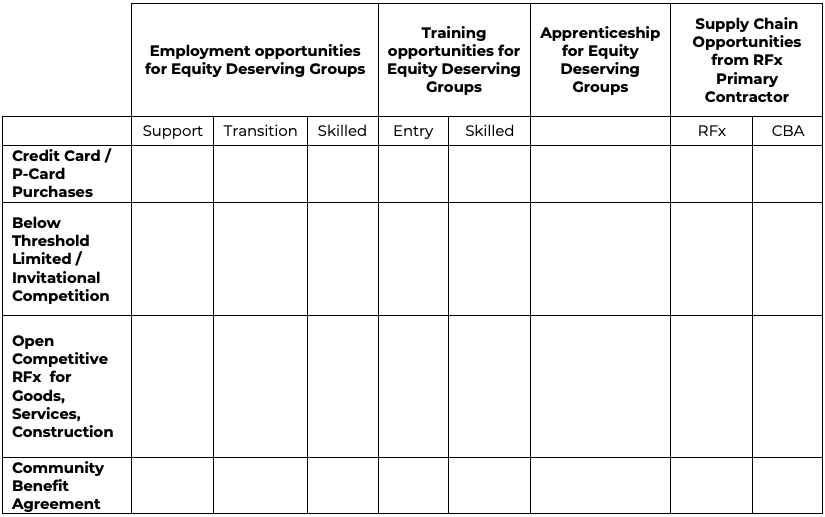Update
Choose the right purchasing strategy for your goals
Apr 28th, 2022
Version Française ici.
Procurement is a powerful tool to address multiple social, economic, and environmental challenges. Social procurement focuses on leveraging social value from existing purchases to create community capital. Through contracting with social enterprises or other social value suppliers that intentionally provide employment, support diversity or increase training and apprenticeships, social procurement creates opportunities for equity-deserving groups.
For example, CleanStart BC, a Certified Social Enterprise who hires people facing barriers to employment, won a competitive bid to provide junk removal and pest control for BC Housing based on the added social value they offer. CleanStart BC reports on this value to the purchaser, and to the community, each month. Read their impact report from work for BC Housing in September 2021 to learn more.
Customers of construction social enterprises such as BuildingUP in Toronto, BUILD in Winnipeg, and Impact Construction in St. John’s see benefit from their contracts. Through the increase in business these social enterprises increase trades training and jobs to vulnerable youth in their communities.
We know solving complex social and environmental issues does not have a simple answer, and social procurement cannot be viewed as a silver bullet solution to our community’s needs. But by using a simple decision-making process we can maximize the opportunities and impacts that come from our purchasing.
Social procurement’s purpose is based on the goals of the buyer. You decide what you need to buy, the best tactic to use for the procurement, and what area you can create impact.
In every purchase, the buyer must decide:
- What are my social value goals?
- What do I need to purchase?
- What social value outcome can I achieve through this purchase?
- What is the appropriate purchasing tactic?
This simple decision tree can help create the best outcome for every contract signed.
Buy with impact decision tree
1. What do I need to purchase?
- Technical specifications, vendor experience and capacity required
- Budget parameters
2. What social value outcomes can I achieve through this purchase?
- Employment opportunities for individuals from equity-deserving groups
- Supportive employment
- Transitional employment
- Skilled employment
- Training and apprenticeship opportunities
- Entry level
- Enhancing skills
- Professional development
- Focused on individuals from equity-deserving groups
- Supply chain opportunities from contractors and subcontractors
- Social enterprises
- Businesses owned by equity-deserving groups
- Local businesses
- Small businesses
3. What is the appropriate purchasing tactic?
- Credit card / P-Card purchases – usually under $5000
- Very flexible and can prioritize social value businesses
- Below trade agreement threshold limited/invitational competition
- Prioritize inclusion of bids from social enterprise and ownership by equity-deserving groups
- Include specific social value outcome language in RFx documents
- Include a Social Value Questionnaire
- Open competitive RFx for goods, services, and construction under $5m
- Include weighted social value criteria ranging from 10% to 25%
- Include a Social Value Questionnaire
- Community Benefit Agreement on large construction project
- Negotiate social value outcomes based on social value goals
- Set targets for community benefits throughout the design, build and operate phases


Now you have the defined purchase, social value outcome, and appropriate tactic. Time to go to market.
If you would like to discuss your social value purchasing strategy please contact Elizabeth Chick-Blount at elizabeth@buysocialcanada.com.

